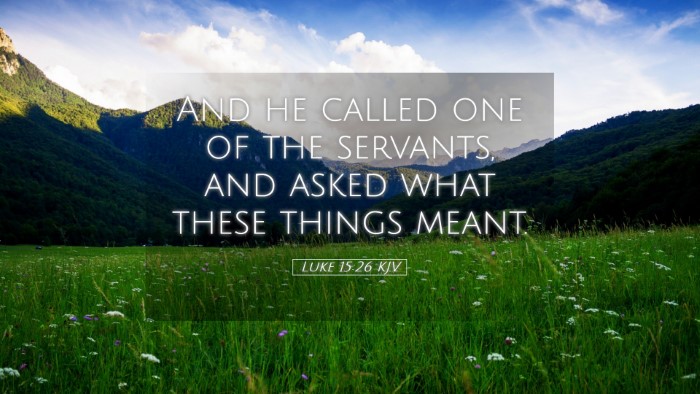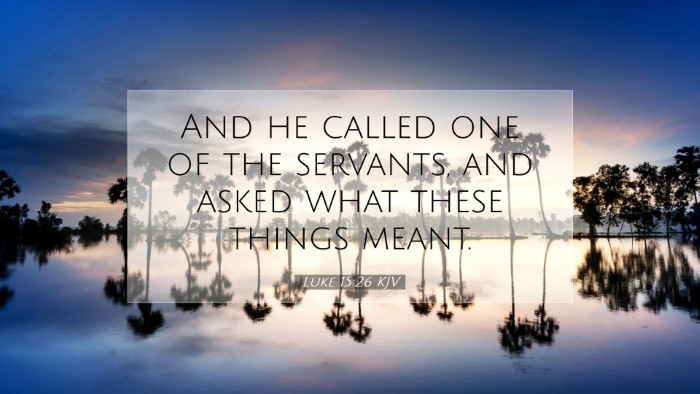Commentary on Luke 15:26
Luke 15:26 is a pivotal verse found within the parable of the prodigal son. This verse reads: "And he called one of the servants, and asked what these things meant." This moment is significant as it portrays the elder brother's reaction upon his return home after hearing the sounds of celebration for his brother's return. The following is a synthesis of insights from historical commentaries on this verse.
Contextual Background
This verse is situated in a larger narrative encompassing the themes of sin, repentance, and reconciliation. The parable illustrates not only the nature of God's forgiveness and love through the father’s response to the younger son but also delves into the attitudes of those who feel wronged or neglected, represented by the elder brother.
Summary of the Parable
The parable itself involves three pivotal characters: the father and his two sons. The younger son demands his inheritance prematurely, squanders it in wasteful living, and ultimately returns, seeking forgiveness. The father's joyful welcome contrasts with the elder son's disdain, culminating in the pivotal moment of the elder son’s questioning in verse 26.
Insights from Matthew Henry
According to Matthew Henry, the elder son’s query to the servant highlights a disconnect in his understanding of grace. Henry underscores that the elder brother, though obedient and dutiful, fails to grasp the depth of joy and love that the father has for the repentant sinner. His inquiry underscores a spirit of legalism, contrasting the father's grace-filled joy. Henry notes:
- The elder son's lack of joy where joy is due represents a critical failure to embody the spirit of the father.
- The servant's role in the elder brother's questioning is significant; it signifies how God communicates His love and forgiveness often through intermediaries.
Reflections from Albert Barnes
Albert Barnes emphasizes the elder brother's pride and self-righteousness. He suggests that by asking a mere servant, the elder brother demonstrates his sense of entitlement and his distance from the father's heart. Barnes comments on the implications of the elder brother’s actions:
- He insinuates that pride often blinds individuals from recognizing the true nature of relationships and grace.
- The elder son’s refusal to enter the feast signifies the broader spiritual struggle faced by the Pharisees and the religious elite of Jesus' time who rejected God's grace.
Interpretation by Adam Clarke
Adam Clarke provides a more theological lens, pointing out that the servant represents the messengers of God who relay the joyous news of redemption and reconciliation. Clarke notes:
- The elder brother's call to the servant symbolizes the way the religious often rely on their works instead of embracing the grace offered through Christ.
- This moment illustrates the broader theme of how many believers struggle with accepting grace as it applies to others, particularly those they deem unworthy.
Theological Implications
The implications of this verse transcend the narrative itself. It raises significant questions for theological reflection concerning:
- Grace vs. Works: How does one reconcile the celebration of grace extended to others, particularly those who may seem undeserving?
- Self-Righteousness: What prevents individuals from fully participating in the joy of God's forgiveness?
- Community and Reconciliation: How does the church today reflect or neglect the inclusive call of God's grace?
Conclusion
In conclusion, Luke 15:26 serves as a poignant reminder of the complexities surrounding grace and duty. The parable reveals the heart of God towards sinners, inviting all to partake in His love, and simultaneously challenges believers to assess their own hearts toward others.
As pastors, students, theologians, and scholars engage with this text, they are urged to consider the profound themes of grace, self-righteousness, and communal rejoicing found within the parable of the prodigal son. Understanding the dynamics at play in this verse is essential for navigating the ongoing dialogue about the radical nature of God’s love and acceptance in a world often marked by division and exclusion.


